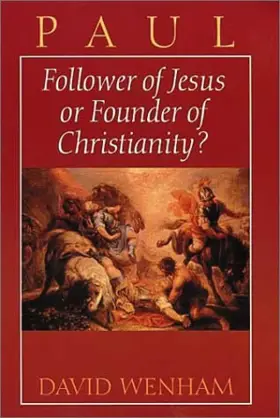

Paul: Follower of Jesus or Founder of Christianity?
Pages
472
Publisher
Eerdmans
Published
4/1/1995
ISBN-13
9780802801241
This book provides a broad, popular look at the relationship between Paul and Jesus.. Wenham studies the Gospels and Paul's letters, systematically compares the teachings of Jesus and Paul, and reveals the intriguing connections and differences between the two. His conclusions make this volume a ground-breaking work with exciting implications.
Reviews
[Full Review]
Grand Rapids: Eerdmans, 1995. Pp. xvi + 452, Paperback, $21.99, ISBN 0802801242. Morna D. Hooker University of Cambridge and Robinson College Cambridge CB2 1TW England This is an ambitious book. Its aim is to examine the question of the relationship of Paul's thought to the tradition about the life and sayings of Jesus: was Paul a faithful follower and interpreter of Jesus, or an innovator, who was in effect the "Founder" of Christianity? In spite of the fact that there are only a couple of places where Paul cites words of Jesus, the topic is a vast one, and Wenham treats it by first comparing and then attempting to connect the teaching of Jesus and Paul on six issues: the kingdom of God, the question of Jesus' identity, the death of Jesus, the mission and nature of the Church, ethics, and eschatology. He then deals with the question of Paul's knowledge of traditions about Jesus' life and ministry, before attempting to summarize his conclusions in a final chapter. There are two ways of tackling this kind of problem. One is to focus on a solitary issue or passage, and examine the evidence concerning it in depth. The other is to adopt the method chosen here, and to survey the whole field, inevitably at a more superficial level. The book is addressed, we are told (p. xiv), to two audiences--general readers on the one hand, and scholars on the other. The author boldly declares that he has tried "to serve two masters," thereby himself (unlike Paul!) rejecting dominical teaching. The result is not entirely satisfactory: ordinary readers are likely to feel that a book of this length is tough going; scholars will feel that there is more to be said at every point in the discussion. The author himself acknowledges the problem (pp. 31-32), admitting that his attempt to address a non-specialist audience necessarily leads to over-simplification. The book examines two basic questions. First, "Is Paul's theological understanding and emphasis similar or dissimilar to that of Jesus?" Second, "Is Paul dependent on the teaching and traditions of Jesus, directly or indirectly?" (p. 19, italics mine). The two questions are dealt with in turn in each of the main chapters of the book. Wenham gives positive answers to both questions, but it has to be said that he is far more convincing in dealing with the broader first question than with the second, narrower, one. Granted the differences of vocabulary and circumstance, the teaching of Jesus and Paul is remarkably similar; but the question of Paul's dependence on Jesus is far more tricky.
[Full Review]

